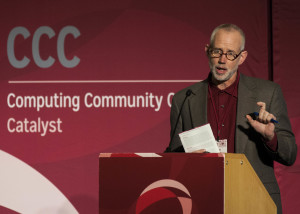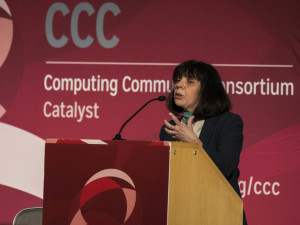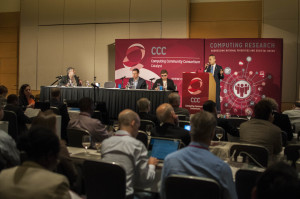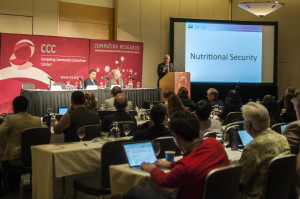
Ross Whitaker, University of Utah
The following is a guest blog post by CCC council member Klara Nahrstedt from the University of Illinois at Urbana – Champaign and past CCC council member Ross Whitaker from University of Utah.
‘Computing in the physical world’ themes are emerging rapidly within our urban and rural areas. Cyber-physical systems, Internet of Things technologies, Big Data analytics algorithms, and new computing sustainability paradigms are being discussed across government, industry, foundations, and academia. This was also the purpose of discussions during the ½ day event, called “Computing in the Physical World” at the Computing Community Consortium (CCC) Symposium on Addressing National Priorities and Societal Needs.
The “Computing in the Physical World” event was divided into three major pieces, the keynote on “Computational Sustainability” by Carla Gomez, short talks and panel discussion on “Opportunities in Urban Environments”, and short talks and panel discussion on “Opportunities in Agriculture, Environment, Disaster, Food-Energy-Water”.

Carla Gomes, Cornell
During the keynote, Dr. Gomez clearly articulated the computational sustainability problem as an uncharted territory for computer science and a highly interdisciplinary area. Computational sustainability represents a new interdisciplinary field that aims to advance computational methods for sustainable development, AND sustainable development means balancing environmental, economic and societal needs. Dr. Gomez stressed that the ultimate goal of sustainable development is the human well-being of current and future generation. It was highly interesting to learn about CompSustNet, the large-scale research network, that exemplifies the computational sustainability. This research network studies themes such as biodiversity, balance of environmental and socio-economic needs, energy and renewable resources, and computational thrusts such as Big Data machine learning, optimization, dynamic modeling, crowdsourcing and others. Through projects such as “Accelerating Materials Discovery for Sustaining Energy” one could see the influence of computational thinking that provides new insights, methodologies and solutions to sustainability problems.

Panel on Opportunities in Urban Environments
The short talks and panel on “Opportunities in Urban Environments”, three panelists, Sokwoo Rhee (NIST), Carter Hewgley (John Hopkins), Charlie Catlett (University of Chicago/ANL) discussed in their short talks smart cities issues from the business, city governments and academic points of view. Several problems were outlined by panelists which also represent future opportunities:
- Many smart city projects are customized and there is an inadequate consideration for future upgrades and extensibility.
- There is a clear lack of measurability of success when it comes to smart cities solutions.
- Deployments are isolated and do not consider the economy of scale.
- One should consider fewer “things in IoT” to be deployed in the smart cities, but adapt them faster and apply them to other domains to solve actual city’s problems.
- It is important to build relation between city government and academia/schools to trust each other and establish talent pipeline to solve actual city’s problems.
- It is critical for cities to have data and subject experts to interpret city’s data.
- Smart cities research needs to be relevant and take risks.
- Researchers who deploy smart city’s solutions need to go back and ask themselves ‘Did the deployed solution work?’.
- To enable broad smart cities’ research, one needs open access to data and tools to help scientists analyze, correlate, search data and predict new insights.
The questions to the panelists ranged from ‘how can we sustain the developed smart cities’ solutions’, ‘how does one establish trust among city’s government, city communities and technologists’, to ‘can one achieve meaningful interoperability via standards’ and ‘what are the main scientific challenges in smart cities’ research’. Some very interesting insights came out during the Q&A such as
- To achieve sustainability of smart cities’ solutions, business sustainability must be developed and financial benefits to cities must be shown since government cannot continue to pay for projects indefinitely.
- Sustainability can be achieved gradually by developing relationships between city government officials and academic researchers, but it must be clear to academic researchers that city officials need solutions to very specific problems and city government is not a funding agency.
- To establish trust among multiple stakeholders, smart city solutions will need to be over-engineered since the solutions will need to work under very diverse conditions. Furthermore, smart city solutions will need to be transparent to communities, especially with respect to privacy protection.
- Many scientific challenges were mentioned including (a) operational and business modeling to understand multi-sector analysis and integration; (b) air flow modeling in cities; (c) wireless spectrum usage and analysis; (d) analysis of multi-modal data sets including video, audio, and diversity of sensory data; (e) measurement science, and (f) large scale open, heterogeneous distributed computing platforms.
- Standards for IoT will be difficult and we will need to wait for the market forces to choose winners and losers. The major question is “Can we do anything to speed up the winners and losers so that standardization can begin?”.

Panel on Opportunities in Agriculture, Environment, Disaster, Food-Energy-Water
The short talks and panel on “Opportunities in Agriculture, Environment, Disaster, Food-Energy-Water” included three speakers: Sonny Ramaswamy (NIFA), Shashi Shekhar (U. of Minn.), and Robin Murphy (Texas A&M). The general consensus of the panelists was that there are enormous stakes for computing applications pertaining to the natural world. The potential impacts and opportunities are profound. The panelists also agreed that the problems posed in these domains are generally very broad, multidisciplinary efforts that will require computational and computer scientists to interact extensively with application experts and develop areas of specialization that dovetail with these domains. The panelists presented insights and comments as follows:
Data science clearly plays an important role in applications of computing in natural and manmade phenomena. However, the data science demands are quite diverse in terms of the types of data (genetics, environment, etc.), the degree of infrastructure, and the nature of the questions (e.g. forecasting, scientific). Likewise, large data infrastructures must operate across many heterogeneous digital environments. Many of the challenges entail systems level solutions within very large computational and physical contexts, combining challenges ranging from robots and mobile computing to large scale simulation and human computer interaction. Data challenges also include the limitations of the measurement systems, which include incorrect/incomplete data and potentials for bias and large degrees of uncertainty.
An important set of problems in the domains of Environment, Disaster, and Food-Energy-Water deal with large scale computation and data management. The scales of the systems under consideration are vast and diverse. This will pose significant challenges for efficiency of large-scale computation and the ability to access information across different scales in time and space, while responding to changes physical events or conditions in a timely fashion (e.g. responses changing inputs or extraordinary phenomenon/disasters).
Human factors also play in important role in the challenges associated with computing in the physical world, both at the small scale (individuals) and larger scales (communities, nations/regions). The ability to incorporate human and social needs into these large scale systems will present enormous challenges for both the data analysis and the mechanisms for user interaction.
Overall, there are tremendous opportunities for computing to impact the human and natural world at very large scales. While some of the technical challenges relate to traditional or conventional domains of computer science, much of this work will stretch the skills/expertise of computing professionals and will require larger, integrated teams or communities with strong multidisciplinary capabilities.









